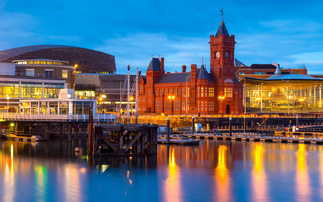In an exclusive extract from his new book, Leo Barasi argues the green movement needs to reach out to those who remain apathetic about climate change
Picture a small living room, crowded with 10 people and noisy with bad-tempered argument. As you watch, you realise not everyone is taking part in the argument - in fact less than half of the crowd are talking. One pair, sitting together, is arguing, not with each other, but with another two people, who are firing back retorts to everything the first pair say. And watching the debate, with expressions ranging from bewilderment to boredom, are the remaining six, who so far haven't said anything (one of them has given up paying attention and is browsing on her phone).
In the debate about climate change those quiet six people in the middle are often forgotten - but they should have our full attention. If they were to join sides with either of the vocal pairs, the new group would have a comfortable majority. Yet it is obvious that the bystanders are not going to be well disposed to the arguing sides so long as the people doing the talking are ignoring them.
While climate deniers furiously denounce what they see as a conspiracy between scientists, the UN, and Al Gore to make us all pay more taxes to a tyrannical world government, the people whose opinions matter most don't care that much either way. They are not angry at climate scientists, they don't think climate change is a hoax, they don't post comments on websites insisting that carbon dioxide is, in fact, good for us. They just don't think about it very much.
But their climate apathy stops the world talking about what it will take to avoid extreme warming. As long as so many people aren't particularly bothered about climate change, there is little appetite for conversations about the difficult measures that are needed to deal with it. Instead, mainstream discussions about the issue mostly stick to uncontroversial proclamations that the world must work together to tackle the problem, or they focus only on the easy measures that will never be enough.
We need to have those difficult conversations. To have a good chance of keeping warming to a reasonably safe level, the world needs to reduce its greenhouse-gas emissions to zero well within a generation. In fact, overall emissions will almost certainly have to be negative - more greenhouse gases will have to be absorbed each year than released. This is a phenomenal challenge and the progress of the past few years in stopping the annual increase in emissions is trivial in comparison.
Meeting that challenge will be impossible without widespread public support. It's true that some of the measures to cut emissions come at little cost and bring benefits unrelated to climate change. For these, public opinion is unlikely to be an obstacle. But some other measures, like switching entirely to clean electricity, would impose costs on the public, even if those costs would eventually be outweighed by savings and don't require most people to do much. And a third set of measures presents the greatest challenge. Cutting emissions from activities like flying and meat-eating is likely to put a direct burden on the public and, apart from reducing climate change, will bring few benefits to balance those costs.
As long as apathy about climate change is widespread, these difficult emission-cutting measures will be endlessly delayed. General public agreement that climate change deserves attention means most governments think there is an electoral advantage to being seen to be dealing with it. This helps explain why so many leaders were willing to sign the Paris Agreement - and why those who openly dismiss the threat of climate change are rare.
But signing up to targets is not the same as achieving them. When meeting the targets depends on voters accepting costs in their everyday lives - through higher bills to fund clean energy, increased taxes on more-polluting vehicles or restrictions on flying or meat consumption - politicians will put off the hard decisions. If only a small proportion care passionately about tackling climate change, the cost to politicians of making decisions that eventually lead to missed emissions targets will be less than the cost of the ire they may face from voters who have been forced to accept sacrifices.
So we must understand how we can hasten the demise of climate apathy. My new book sets out some of the answers, focusing on those quiet six people in the living room, who accept that climate change is real and a problem, but don't pay much attention to it and aren't yet willing to make sacrifices in the name of cutting emissions. Until climate apathy is overcome, it will be as if the world is driving with the brakes on as it tries to escape the disaster that is rapidly closing in. Turning apathy into support for serious measures to cut emissions would give everyone a much better chance of reaching safety.
The Climate Majority: Apathy and Action in an Age of Nationalism by Leo Barasi is published by New Internationalist on 21 September







